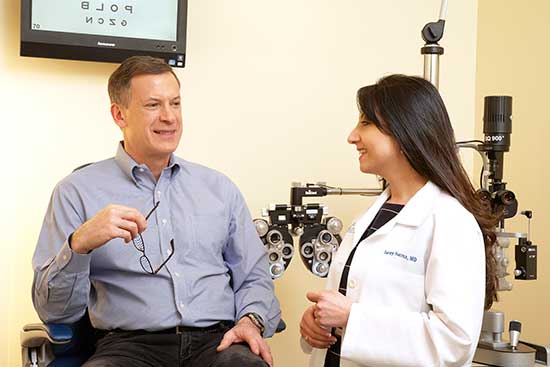Uveitis
Rutzen EYE SPECIALISTS & LASER CENTER
What is Uveitis?
Uveitis is inflammation of the uvea, which is a tissue inside the eye. The uvea is made up of three parts:
- the iris (the colored part of the eye that surrounds the pupil)
- the ciliary body (the part of the eye that makes fluid)
- the choroid (the layer of tissue just under the retina at the back of the eye).
Inflammation can affect any or all of these parts. Symptoms, treatment, and effects are different depending on which parts of the eye are affected.
How does it occur?
Most of the time, the cause of uveitis is not known. It can be related to autoimmune diseases that affect other parts of the body, such as sarcoidosis and some types of arthritis. Less often, infections like herpes, syphilis, or Lyme disease can cause uveitis.
What are the symptoms?
Uveitis that involves the front part of the eye has the following symptoms:
- sensitivity to light
- redness
- tearing
- deep aching pain
- reduced vision.
These symptoms may occur in just one eye. They tend to appear suddenly and worsen quickly.
When the middle or back part of the eye is affected, the only symptom may be problems with your vision. You may see floaters (specks in your field of vision that look like little bugs or threads). Both eyes may be affected but not to the same degree.

How is it diagnosed?
Your eye doctor will ask about your symptoms and examine your eyes. Usually he or she will dilate (enlarge) your pupils to better see the inside of your eye. Your eye doctor will look closely to see which parts of your eye are inflamed. You may need blood tests or X-rays to check for other diseases.
How is it treated?
The goal of treatment is to reduce the inflammation in your eye and make you more comfortable. Reducing the inflammation reduces the risk of complications later.
Corticosteroid medicine is used to reduce inflammation. You may start using the medicine as an eyedrop. If the eyedrops do not help, your doctor may prescribe pills to take by mouth or shots around or into the eye. Corticosteroids may cause cataracts or high eye pressure. Your doctor will want to check your progress closely, especially if you use these medicines for a long time. Uveitis itself can also cause cataracts and high eye pressure.
As the inflammation is brought under control, your doctor will give you instructions about how to gradually stop using the drops and pills. It is very important to follow these instructions closely. A sudden decrease in these medicines can cause the inflammation to come back.
If the inflammation is so severe that you need to take high doses of steroids or if the steroids are not helping enough, you may need to take another type of medicine called an immunosuppressant. This medicine is related to chemotherapy drugs, and you will be watched closely for side effects. A kind of medicine that also affects the immune system, such as Remicade, may sometimes be used as well as or instead of an immunosuppressant.
If the inflammation is caused by an infection, medicines to treat the infection are used in addition to medicines to control the inflammation.
How long will the effects last?
Like its symptoms and treatment, the effects of uveitis depend on its cause. When the cause can be found and treated, you may not have any long-term effects. When uveitis is related to a problem that affects other parts of your body, the effects will last until you get proper treatment for that problem.
Uveitis may come back. See your eye doctor promptly if any of your symptoms return. If it is not treated, uveitis can cause problems such as:
- high pressure inside the eye and permanent damage to the optic nerve
- cataracts (clouding of the lens of the eye)
- clouding of the cornea
- abnormal blood vessels inside the eye.



